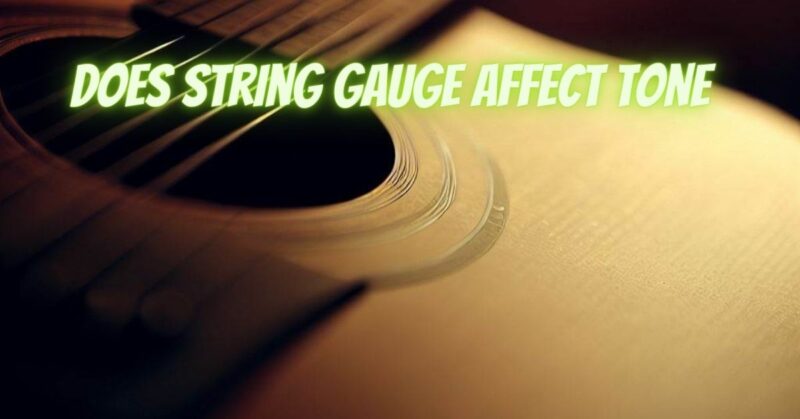The choice of guitar strings is a crucial consideration for any guitarist aiming to shape their unique sound. Among the factors that influence the tone of a guitar, string gauge plays a significant role in defining the instrument’s character and sonic qualities. In this article, we’ll explore the impact of string gauge on tone and delve into the nuances that make each gauge a distinctive tool for crafting your musical voice.
Understanding String Gauge:
String gauge refers to the thickness of the individual strings in a set, usually measured in thousandths of an inch. For example, a set with a gauge of 10-46 would include a high E string with a diameter of 0.010 inches.
The Influence of String Gauge on Tone:
The relationship between string gauge and tone is complex and multifaceted. Different string gauges affect various aspects of the guitar’s sound, including:
1. Tension and Resonance:
Thicker strings generally require more tension to reach the same pitch as thinner strings. As a result, heavier gauges tend to provide a firmer feel and produce more pronounced resonance and sustain. The increased tension also affects how the strings interact with the guitar’s body and neck, influencing the overall sonic response.
2. Brightness and Warmth:
Thinner strings tend to have a brighter and more treble-focused tone due to their lower mass and tension. In contrast, thicker strings often produce a warmer and more full-bodied sound, emphasizing the lower frequencies.
3. Dynamics and Articulation:
The gauge of the strings can affect how the guitar responds to different playing techniques. Thinner strings are generally more responsive to light fingerpicking and delicate playing, offering enhanced articulation and dynamic range. Conversely, heavier strings can handle aggressive picking and strumming, providing a powerful and robust tone.
4. Bending and Playability:
Thinner strings require less finger pressure and offer easier bending, making them well-suited for expressive playing styles. On the other hand, thicker strings may require more finger strength and can affect playability, particularly when executing wide bends.
5. Genre and Playing Style:
String gauge often correlates with specific musical genres and playing styles. For instance, jazz and blues guitarists often favor lighter gauges for their expressive playing, while rock and metal players may opt for heavier gauges to achieve the required power and sustain.
Finding Your Perfect Tone:
The choice of string gauge is a deeply personal decision that depends on your playing style, musical preferences, and the sound you wish to create. There is no one-size-fits-all answer, and what works best for one guitarist may not suit another.
Experimenting with different string gauges can be a transformative experience, providing new sonic possibilities and inspiring fresh creativity. Many guitarists find a middle ground by using hybrid gauge sets, combining various thicknesses to balance playability and tonal characteristics.
In conclusion, string gauge undeniably affects the tone of a guitar. Thicker strings offer increased tension, warmth, and power, while thinner strings provide enhanced playability, brightness, and expressive capabilities. The choice of string gauge empowers you to shape your musical voice, much like an artist selecting colors for their canvas.
Embrace the diverse range of string gauges as tools in your sonic palette, allowing you to craft a unique and captivating sound that resonates with your artistic vision. Whether you prefer the depth of heavy strings or the agility of light strings, the quest for your perfect tone is an ongoing journey of discovery and expression. Let your guitar become an extension of your musical soul, and let the interplay of string gauge and tone guide you to create music that speaks to the heart and spirit of both you and your audience.


